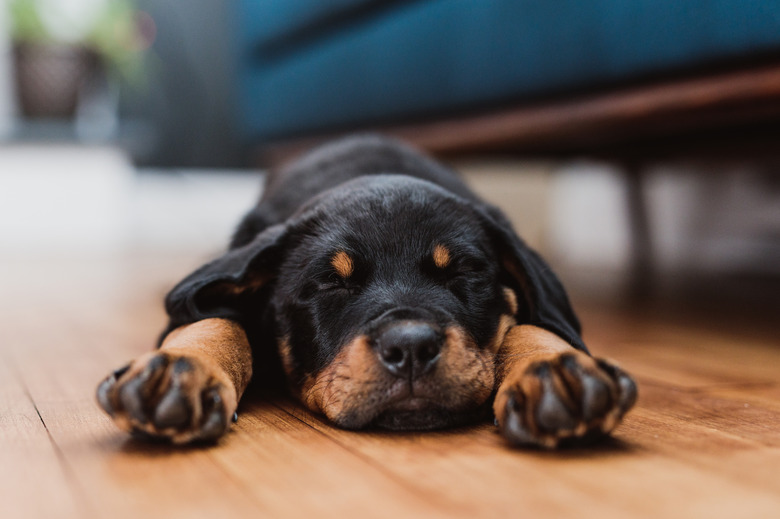Is My Dog Happy Sleeping All Day?
There's nothing better than a good nap in the sun, but have you ever thought, "My dog sleeps all day"? Like all animals, dogs need their sleep, and your dog may be perfectly happy catching some z's in between playtime and mealtime. However, in some cases, too much sleep might be a sign that your dog needs a trip to the vet.
The dog sleep cycle
The dog sleep cycle
Dogs have sleep patterns that are similar to humans' sleep patterns. When a dog is sleeping lightly, he's still easy to wake and isn't fully relaxed. Once the dog enters the REM phase of sleep, his body will fully relax, and he may even seem to be dreaming. This is the phase when your dog may twitch, whimper, or move as he dreams.
If you've ever seen how quickly your dog can wake up out of a deep sleep, you'll understand that his style of sleeping is quite different from how humans sleep. Dogs wake up much more easily, and they're often still somewhat on alert even when they're resting. Because they wake up so frequently, dogs sleep more than humans do, which can give you the impression that your dog is sleeping all day.
Different breeds and sleep
Different breeds and sleep
Some breeds like to sleep more than others. French and English bulldogs tend to take it easy and enjoy their naps much more than higher-energy breeds like Australian shepherds. Part of this has to do with a dog's natural behavior, but a dog's activity level also influences the amount that she will sleep.
If your dog is a working dog, she will naturally spend a lot of her day at a high activity level. Working dogs exert a lot of physical and mental energy each day, so they won't sleep all the time. These dogs will definitely need quality sleep at night to be ready for the next day of activity.
On the other hand, dogs with a more sedentary lifestyle may sleep simply out of boredom. These dogs may not need quite as much sleep as they're getting, but when they're waiting for you to get home from work or are killing time before dinner, they may nap because it's something to do. In cases like these, your dog may not be particularly happy when she's sleeping, but adding some stimulation to her life, like more frequent walks and longer playtime, can help to keep her entertained.
Dog age and sleep
Dog age and sleep
Your dog's age can also affect how much he will sleep. Puppies tend to sleep a lot to replenish the energy they spend in growing up, and senior dogs also tend to need more sleep. Different senior dogs need different amounts of sleep, and while one senior dog may sleep for 14 or 15 hours each day, another senior dog could sleep for 18 to 20 hours a day.
In determining whether your dog is sleeping too much, remember that different breeds are considered to be seniors at different ages. Great Danes that are only five years old are considered to be senior dogs, while Maltese dogs are regarded as seniors when they're seven or eight years old.
Signs for which to watch
Signs for which to watch
A sleepy dog may be perfectly healthy and happy when enjoying some quality nap time, but in some circumstances, a dog who is sleeping excessively may have an underlying medical condition. A sudden change in sleep habits may indicate that your dog has a health issue, so if you're saying to yourself, "My dog is sleeping a lot more than usual," then take her to the vet.
Your dog's changing sleep habits may be accompanied by other symptoms such as loss of appetite, loss of interest in playing, coughing, sneezing, vomiting, diarrhea, and overall lethargy. Keep an eye out for additional symptoms that may signal that something is amiss with your dog.
If your dog is sleeping all day, she may be completely happy and just getting the rest that she needs. Watch your dog for signs that she is happy, like plenty of enthusiasm when playing, bright eyes, playful barks, and excitement to see you each day. Signs like lack of energy, appetite changes, behavior changes, and restlessness can indicate that your dog isn't happy, and she may benefit from a trip to the vet.
Always check with your veterinarian before changing your pet's diet, medication, or physical activity routines. This information is not a substitute for a vet's opinion.
